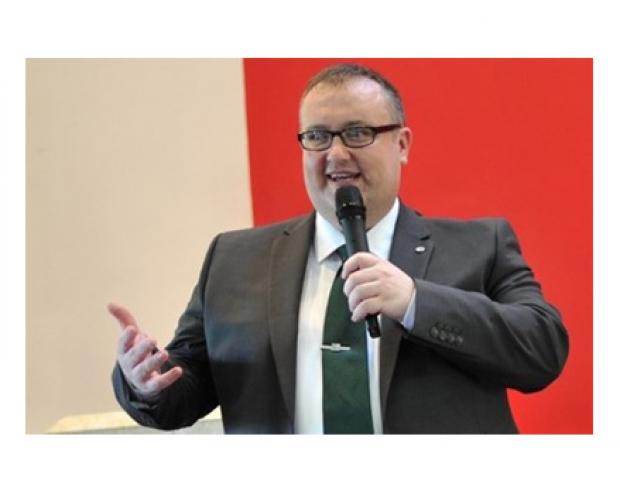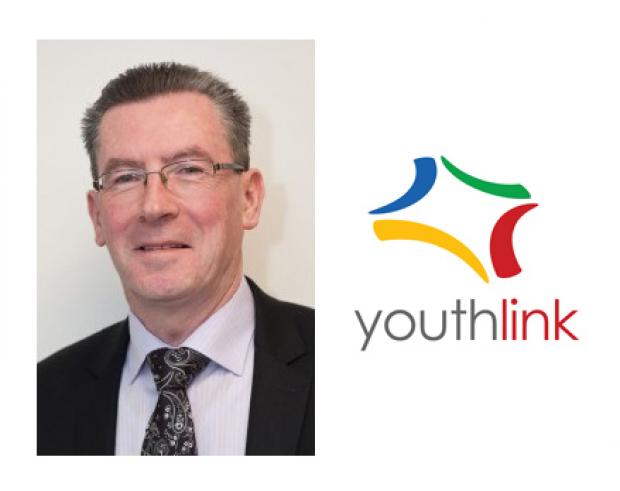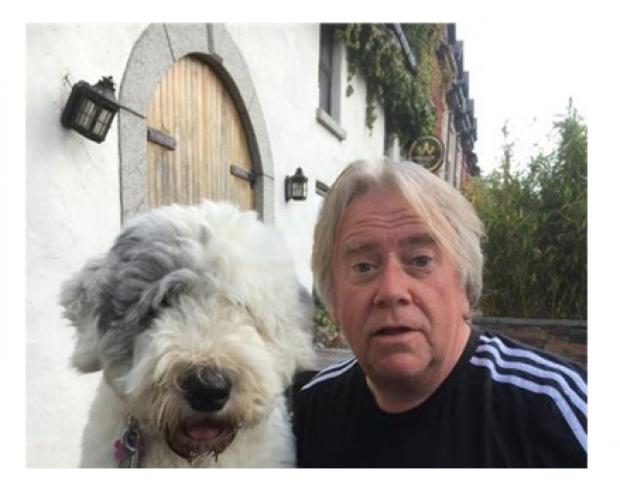The profiles below provide insight into community and voluntary sector workers, project leaders, directors, and staff who have worked with TEO to deliver projects that contribute to the goals set out in the T:BUC strategy.
Br. Darren O’Reilly
Organisation: Koinonia John the Baptist Ireland/Fearless Youth

Brother Darren O’Reilly is a Church member and Community worker for Koinonia John the Baptist Ireland/Fearless Youth, who have delivered T:BUC Camps funded by TEO and managed by the Education Authority (EA). The T:BUC Camps programme provides opportunities for young people aged 11 to 19 to come together to build positive relationships.
Q1. How long have you been involved in good relations work?
My first ever good relations project was a trip to South Africa in 2003. I was part of a wider peace project representing church based youth work with people from across the political spectrum. The friendships I made and challenging conversations I had during that project shaped my professional life ever since.
Q2. What motivated you to deliver a good relations project?
Our organisation had no youth work projects, but our adult groups had developed some really meaningful relationships with local churches. So, our first ever youth project was motivated by the desire to replicate the positive adult relationships in a youth context. We began Fearless, the delivery vehicle for our TBUC projects, for the first time in 2017.
Q3. Tell me one thing about yourself your colleagues wouldn’t know?
That would be telling… Maybe that I was an Ulster champion Irish dancer, and a qualified ceili dance teacher?
Q4. When you aren’t working in the good relations field, what do you enjoy doing?
I’m a consecrated brother, so most of my time outside of good relations youth work is spent in a balance of prayer and community life. This involves visiting people in need, welcoming people to our home and developing opportunities for adult faith formation.
Q5. How have you found working with funders on project planning and delivery?
It has been a very positive experience - I get the sense the objective of the funders (TEO and EA) is for creative work to be carried out in a variety of contexts. This is important for us in the faith-based youth sector. Peacebuilding is often viewed as an added extra rather than an integral part of the youth work programme. The funders have carried out monitoring visits, been supportive if there are any questions, and act as collaborators on the project rather than just funders.
Q6. Approximately how many participants does your programme have?
At our T:BUC camp we had 106 young people and 28 youth volunteers. We use the T:BUC programmes to help develop and train our volunteers in diversity youth work.
Q7. Do you work with any other good relations funders in the delivery of your programme?
We haven’t worked with any other funders so far. T:BUC has provided a solid backbone for our projects. Each of our projects are facilitated by volunteers, so funding goes only to project delivery.
Q8. How central is collaborative working in how you approach the delivery of good relations projects?
Our project was founded from a principle of collaboration and partnership. We work with young people from many different community backgrounds. We also work closely with Youthlink:NI, and our young volunteers are all Millennium Volunteers with Volunteer Now. As well as these partnerships, we create a social hub at summer camp at Summer Madness, which is open to any other T:BUC groups on site to participate in, and we have supported other churches in creating their own local TBUC project.
Q9. Can you tell me one thing that really worked well in your project?
Creating the social hub at the summer camp provided space where our young people from all backgrounds could socialise, and facilitated small group discussion.
Q10. Can you tell me one improvement you could make to your project?
Social action and outreach: This is just beginning this year. But I feel a stronger social action focus will allow young people to discover the potential they truly have to work together to building a united community, especially with those who are normally excluded.
Q11. Can you tell me one thing Government can do to further help people like you deliver good relations projects?
Greater flexibility in the delivery of good relations projects would be very beneficial. Young people need to have a voice in shaping the project throughout the process, and sometimes the traditional model can be a bit restrictive. Also, there is a need to try and better recognise the multiple layers of identity in young people’s lives: national, political, religious, sexual orientation, culture - and permit youth organisations to develop a bespoke response to each of these elements, rather than solely focus on legacy and politics.
Q12. How have good relations outcomes helped inform the design and delivery of good relations projects you have been a part of?
The focus on T:BUC good relations outcomes has provided shape and given energy to our ongoing good relations projects. This has been an important and positive change in how we plan and delivery provision. However, evaluations can focus too tightly to questions of legacy and cultural difference rather than visionary outcomes such as supporting communities. An ideal project will explore difference, leading a group to accepting and celebrating their diversity in order to benefit their communities. This process can be more difficult when monitoring focuses too specifically on community difference. This has the effect of creating projects of short lifespan.
Patrick White
Organisation: Youthlink

Patrick White is the Director of Youthlink, a peace building agency that delivers good relations projects funded by TEO.
Q1. Tell us about your journey in delivering good relations work.
My personal journey began as Youth Tutor in delivering community relations work in St MacNissi’s College, Garron Tower, Co Antrim. I was involved in school and youth projects in collaboration with Co-operation North.
In 1992 I moved to Youth Link, then a new organisation established by Churches from both of the main traditions here. The focus was to provide community youth work training and education, and improve community relations. I am now the Director of the organisation and in 28 years my role has changed often - Youth Link continues to be on a journey undertaken by people within an ever-changing social, political, economic, cultural and environmental context.
Q2. Tell me one thing about yourself your colleagues wouldn’t know, and some things you like doing outside work.
I come from a rural farming background in Co Antrim where in a mixed community there was always good neighbourliness and practical co-operation. My upbringing has helped to shape my approach to community relations work. It is also why I enjoy hill walking in Donegal.
Q3. Briefly describe the good relations project(s) you are involved in.
I am committed to the Youth Link vision of Churches working together to build excellence in youth work and ministry towards a just, peaceful and flourishing society based on the common good.
This has led to various projects in developing good relations / community relations practice, including sponsored study toward OCN accredited and Degree level good relations qualifications.
On an annual basis approximately 1000 young people, youth practitioners and adult volunteers achieve accreditation. The programmes are delivered by a team of 20 qualified full-time staff and 50 sessional workers.
Q4. How have you found working with TEO on these projects?
TEO has been flexible in its approach to programme delivery allowing contexts to shape responses. TEO has provided funding for a Common Good Community Encounters Project and T:BUC Camps programmes. It would be great to see more long term funding opportunities to inform more substantial good relations interventions in the future.
Q5. How has focusing on outcomes helped inform the design and delivery of good relations projects you have been a part of?
The Youth Link programme has been developing over 28 years. The developing Youth Link ethos is made up of inclusive relationships and effective leadership. Youth Link is always asking the questions ‘How much did we do?’, ‘How well did we do it?’ and ‘Is anyone better off?’.
Strategic aims include actions, performance measures and desired outcomes. These have been essential to the design and delivery of all of Youth Link’s good relations programmes, and ensure we are contributing to the desired aims of the T:BUC strategy.
Gordie Walker
Organisation: Intercomm

Gordie Walker is a community worker for Intercomm, a peace building agency that delivers good relations projects funded by TEO.
Q1. Tell us about your journey in delivering good relations work.
I have a long association in the field of good relations/community relations work. I started my long journey in 1983 as a volunteer at the Corrymeela Centre Ballycastle working on various youth and adult programmes that looked at building good relations.
Corrymeela was a life changing experience for me and set me on the road to facilitating bringing people together to improve relations and bring about positive change. My motivation in getting involved in this work was seeing that even the smallest of steps taken could lead to massive change in people’s outlooks and in community life.
In the past I have had an opportunity to work for and be involved with many leading Peace building organisations. In all of these roles I have tried to bring about change through the promotion of good relations. I believe that there needs to be a certain set of core values and principles that are needed to build trust and lasting relationships.
Q2. Tell me one thing about yourself your colleagues wouldn’t know, and some things you like doing outside work.
In another life I am a very successful musician playing drums for a few semi-professional bands. I have toured all over Europe, UK, USA and Japan. This as you can guess is completely different from my day to day role here at Intercomm. However the peace building skills do come in handy every now and again.
Q3. Briefly describe the good relations project(s) you are involved in.
At present we are involved in the recruitment and delivery of 5 programmes to promote and support good relations in the North of the City through the North Belfast Strategic Good Relations Programme (NBSGRP). We aim to deliver these programmes to over 500 participants from across North Belfast.
All of our programmes are funded through TEO, and some staffing posts are funded through the Community Relations Council core funding programme. This is a great example of how the TEO funding package works, with CRC core funding and TEO providing the funding for programme and project activity.
Q4. How have you found working with TEO and CRC on these projects?
I believe that we as an organisation have formed a very good working relationship with TEO and CRC. We value the support given not only in terms of finance but also in terms of guidance and practical support. Without this support it would be very difficult to provide the level of activity we provide.
Q5. How has focusing on outcomes helped inform the design and delivery of good relations projects you have been a part of?
Focusing on outcomes allows us to evaluate if the actions we are taking and the delivery methods we are using are working and are leading to the desired good relations outcomes agreed with TEO and CRC. If this is not the case then it provides an evidence base we can use to make amendments to the programmes. This is vital in terms of programme delivery and improvement.
Further information
If you would like to know more about the projects mentioned in any of the profiles above, or information on any other aspect of the Together: Building a United Community strategy, you can contact the TEO Good Relations Outcomes team via email: GR.outcomes@executiveoffice-ni.gov.uk
